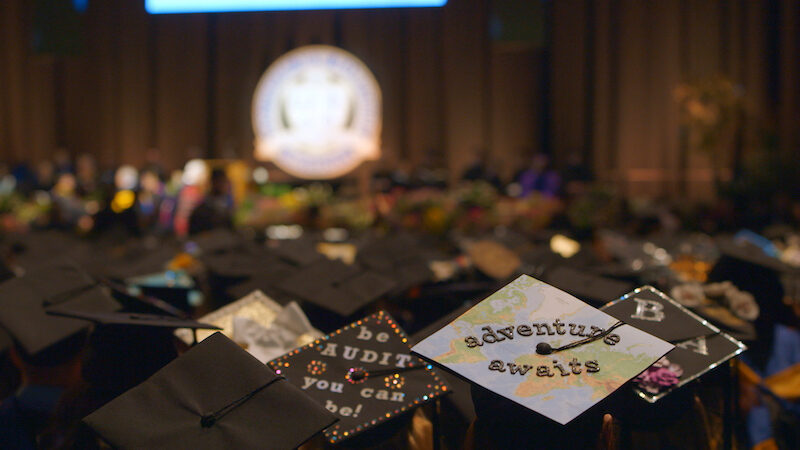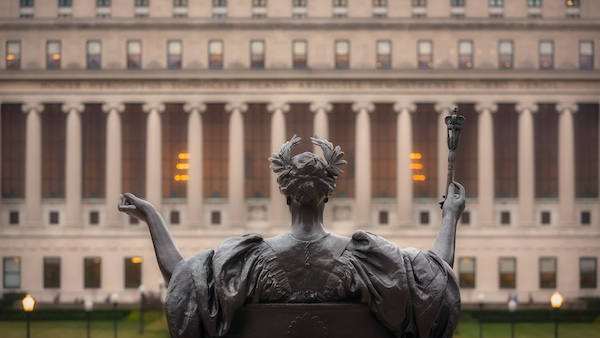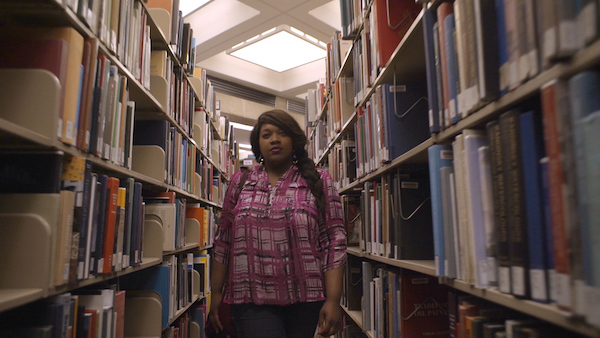A Very Likely Truth
Review of Unlikely at Northwest Film Forum.
Written by TeenTix Newsroom Writer Alison Smith and edited by Teen Editor Joshua Fernandes.

Unlikely starts with an incident that made headlines across the country, especially captivating critics of higher education: the Varsity Blues scandal. At least 51 wealthy individuals, including some of America's most beloved celebrities, were caught committing fraud to get their kids into prestigious colleges. Former Full House star Lori Loughlin, for example, passed off her daughters as elite rowers, although I doubt either of them even knew what “coxswain” meant.
Unlikely tells us the enormous amount of media attention devoted to that scandal and other, more general controversies surrounding elite colleges distract us from a graver problem that affects far more people: America’s dismal college drop-out rate. The percentage of students who graduate in six years is less than 60 percent. Many of these students end up saddled with burdensome debt, and since they didn’t get a diploma, their time at (often for-profit) colleges is worthless in the eyes of the job market. As the movie puts it, those with “some college, no degree” are the most likely to question higher education’s value.
The schools that do the best job of supporting students toward graduation, according to Unlikely, are the elite institutions whose students are already the most likely to graduate. These colleges pour money and resources into counseling and career advising because of the pressure they feel to keep their graduation rates high. While their motives might not be entirely pure, these colleges’ efforts to support students are undoubtedly positive. Still, very few students are educated at these wealthy institutions.

The film lambasts the U.S. World and News Report’s rankings of colleges and universities with a fiery passion that (almost) rivals that of my college counselor.
The film describes how, out of the metrics that determine a school’s ranking, most are correlated with students’ wealth: graduation rates, student selectivity, financial resources, and—most damningly—alumni giving. Perhaps because of America’s obsession with the slightest shifts in the rankings (the film shows clips of news anchors analyzing why Harvard and Princeton have swapped #1 and #2 places, respectively), few school administrators work to admit more low-income students. Unlikely’s hero is surely Nancy Cantor, whom the movie praises so fawningly it almost feels like a lifetime achievement award at the Oscars. As chancellor of Syracuse University, Cantor expanded the school’s scholarship program. Yet as Unlikely tells us, Syracuse dropped eight spots in the rankings during her tenure, and not everyone (see: the authors of an editorial in the school’s paper) were happy about her focus on recruiting low-income students.
Unlikely is most effective, though, when it’s putting a name, face, and personal narrative to dismal statistics. One of the most compelling is that of a high-achieving, low-income student from Georgia who earned excellent grades, but laments that his SAT score determined his future. Another interviewee, when asked how she made the choice to attend the grossly exploitative for-profit Daymar College, says—without even having to think about it—“Commercials.”

The students profiled in the movie are a diverse group: many are low-income, the first in their family to go to college, or older learners with families they have to take care of. Yet one of Unlikely’s central messages is that higher education in America operates according to a “one size fits all” philosophy, where all but the most resource-rich institutions ignore the divergent needs of different students.
At times, though, Unlikely feels more like an ad for various education initiatives and reformers than an even-handed documentary. In a section about LeBron James’s charity, which gives scholarships to students from his hometown, a cheery voice-over informs us that the program also gave away 750 tablets so that students can “learn through technology.” I had to wonder who wrote that line: a documentarian or the charity’s PR person. The aesthetics of Unlikely are also lacking. The film’s janky, Saturday morning cartoon-esque animations try to illustrate higher education’s problems—think students falling through cracks in the floor—with discordantly cheery music.
Still, Unlikely is a sobering watch for anyone who has heard that America's universities are “the best in the world.” The film shows the powerful effects of economic inequality and makes a compelling case for student support programs. As one college dropout puts it, “All I needed was that tiny push.”
Lead photo caption: Film still from Unlikely by Director Jaye Fenderson.
1. https://www.cappex.com/articles/blog/government-publishes-graduation-rate-data
The TeenTix Newsroom is a group of teen writers led by the Teen Editorial Staff. For each review, Newsroom writers work individually with a teen editor to polish their writing for publication. The Teen Editorial Staff is made up of 6 teens who curate the review portion of the TeenTix blog. More information about the Teen Editorial Staff can be found HERE.
The TeenTix Press Corps promotes critical thinking, communication, and information literacy through criticism and journalism practice for teens. For more information about the Press Corps program see HERE.


